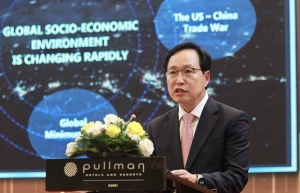The pitfalls in luring new investment from overseas
 |
| Nguyen Viet Ha, Managing director BowerGroupAsia Vietnam |
Recent changes to the international and domestic investment environments are opening new opportunities and creating new challenges for Vietnam. They both demand policy changes that enable Vietnam to capture the positives and overcome the negatives.
The Vietnamese government has also emphasised digital transformation and digital economy in various resolutions and legislation as an important strategy and priority for future socioeconomic development.
This direction will not be realised, however, without specific and open policies and implementing mechanisms to attract investment into digital services. Many new policies require immediate government attention.
Cloud computing and data centre services are digital infrastructure services essential for the development of a digital economy. Investment in these services should be incentivised to meet the increasing demands for digitalisation. While no particular or clear incentives have been introduced for investors in these services, regulations are being developed to tighten state control of these services through a range of licensing, registration, certification, and reporting requirements as if they were traditional telecom services.
In addition, Vietnam’s quality standards for these services have not been updated in accordance with international standards. These deficiencies are major barriers for foreign investors to participate in providing these services in Vietnam.
The development of new telecommunications infrastructure, including satellite-based internet services, is also gradually forming a new trend in the development of the Internet of Things. Although satellite-based internet technology is an efficient alternative for the costly and instable cable-based telecom infrastructure, investors are currently restricted in both foreign ownership and operation that prevent investors from bringing new satellite-based Internet technologies and services into Vietnam.
New policies that are more open to foreign investment in telecom services are needed to attract foreign investors and create a preferable regulatory environment for the development of new digital services technologies.
The government’s strategy to promote digital transformation and develop the digital economy is vital and is consistent with the international development trends. The strategy will only be realised, however, if certain restrictions, conditions, and barriers against foreign investment in IT and telecoms are removed. In addition, there should be particular regulatory incentives and support measures for investment and business activities in these industries.
Another important factor to attracting foreign investment is the stability of financial policies, especially tax policies.
When investors plan for a long-term project, they expect that policies on taxation, interest rates and foreign exchange are stable throughout the project to avoid unexpected changes to the originally estimated financial plan. Any increase of the tax rate, the addition of new taxes on a product or a change to interest and exchange rates should be considered with caution to prevent negatively impacting relevant industries and the business environment.
When changes to these policies are inevitable, a transitional period or the enactment of supporting policies that allow businesses to have sufficient time and prepare to adapt to the changes are necessary.
Finally, investors and businesses appreciate the government’s efforts in reducing and simplifying administrative procedures to facilitate business activities.
Instead, the number of removed or simplified administrative procedures remains modest or unchanged while new regulations continue to add more administrative procedures such as licensing, registration, certification, and reporting requirements. This causes overlapping licensing requirements and adds more cost and administrative burdens on the shoulders of investors.
To make administrative reform more effective, in addition to removal and simplification of administrative procedures, new draft regulations must eliminate outdated measures and make sure that new unnecessary requirements are not created.
Vietnam is facing new opportunities to further grow the economy towards a developing country with the high-middle income per capital by 2030. To achieve this goal, Vietnam will need not only its policies supporting for growth, but also effective implementing mechanisms together with transparency and accountability from the relevant agencies.
 | VIR honours investors who help make Vietnam an FDI success story VIR has granted medals to honour the investors, businesses, and organisations that have contributed to making Vietnam a foreign direct investment (FDI) success story. |
 | VIR honours investors who help make Vietnam an FDI success story (photo) VIR has granted medals to honour the investors, businesses, and organisations that have contributed to making Vietnam a foreign direct investment (FDI) success story. |
 | The favourable factors for FDI in the paper industry The trend of Asian countries such as Japan, South Korea, and China investing in the paper industry is set to continue. Vietnam Pulp and Paper Association general secretary Dang Van Son spoke to VIR’s Van Nguyen about future industry developments. |
What the stars mean:
★ Poor ★ ★ Promising ★★★ Good ★★★★ Very good ★★★★★ Exceptional
Related Contents
Latest News
More News
- IP alterations shape asset strategies for local investors (January 22, 2026 | 10:00)
- 14th National Party Congress: Vietnam - positive factor for peace, sustainable development (January 22, 2026 | 09:46)
- Japanese legislator confident in CPV's role in advancing Vietnam’s growth (January 22, 2026 | 09:30)
- 14th National Party Congress: France-based scholar singles out institutional reform as key breakthrough (January 21, 2026 | 09:59)
- 14th National Party Congress: Promoting OV's role in driving sustainable development (January 20, 2026 | 09:31)
- 14th National Party Congress affirms Party’s leadership role, Vietnam’s right to self-determined development (January 20, 2026 | 09:27)
- Direction ahead for low-carbon development finance in Vietnam (January 14, 2026 | 09:58)
- Vietnam opens arms wide to talent with high-tech nous (December 23, 2025 | 09:00)
- Why global standards matter in digital world (December 18, 2025 | 15:42)
- Opportunities reshaped by disciplined capital aspects (December 08, 2025 | 10:05)

 Tag:
Tag:




















 Mobile Version
Mobile Version